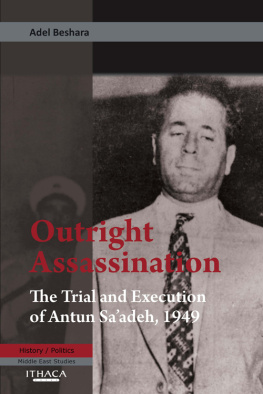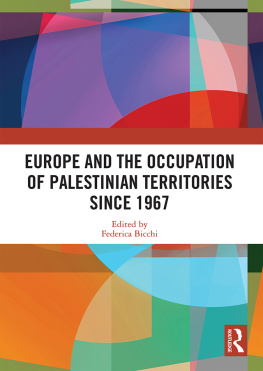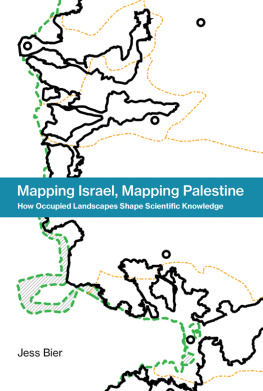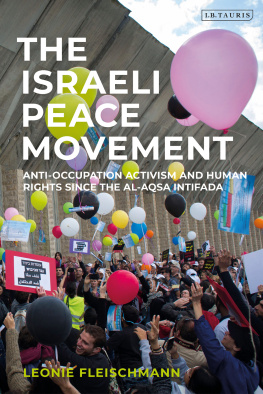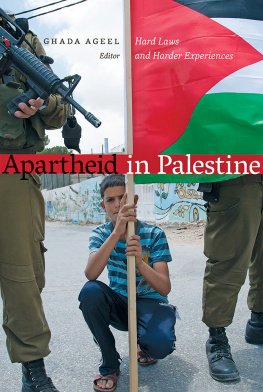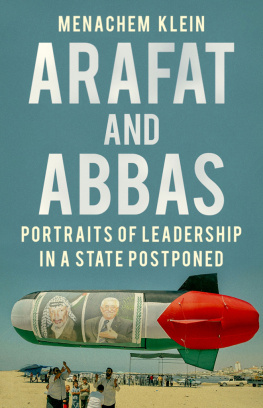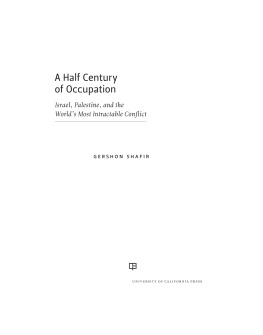
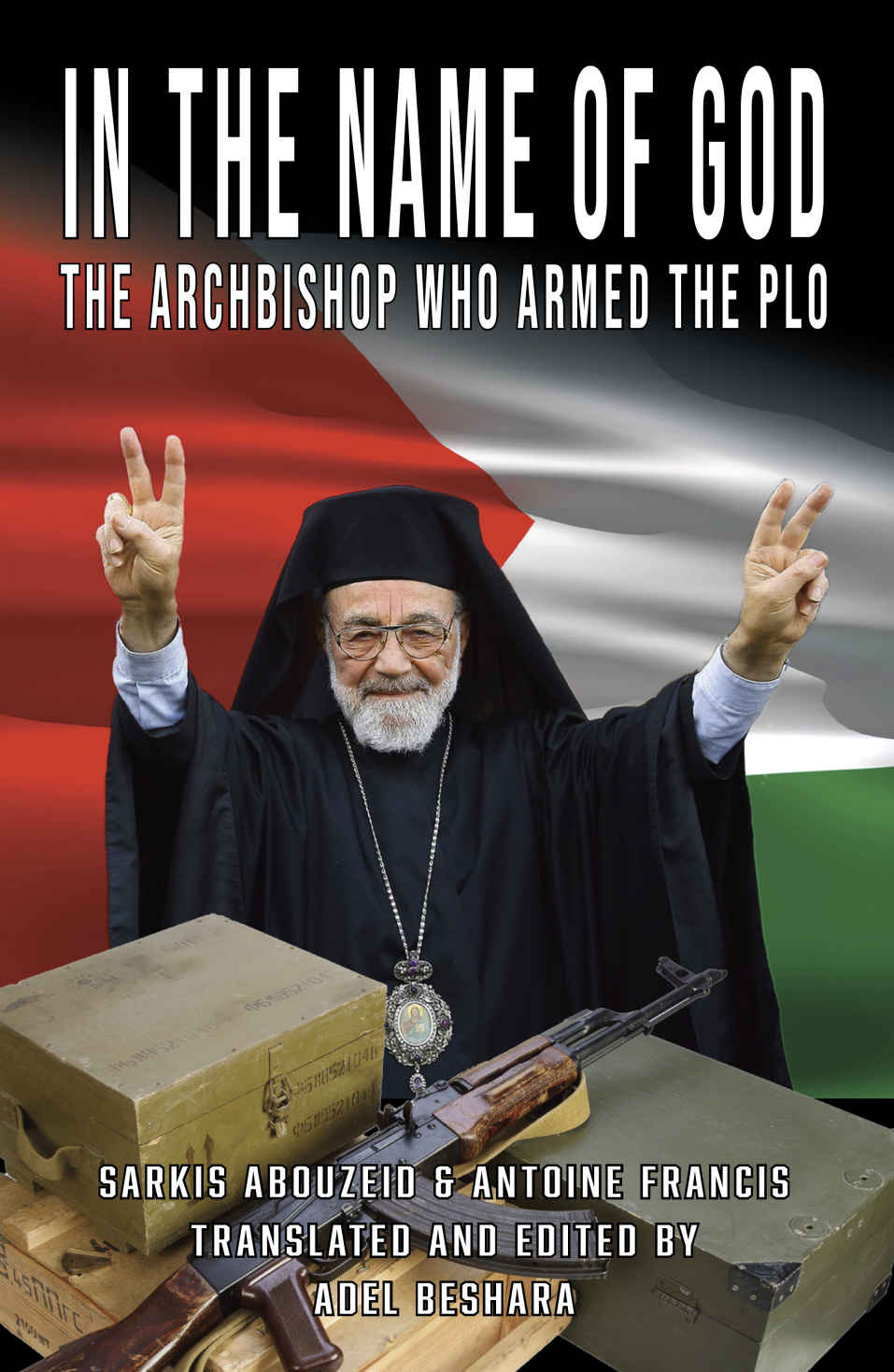

In the Name of God
The Archbishop Who Armed the PLO
Translated and edited by
Adel Beshara
Original interviewers
SarkisAbouzeidand Antoine Francis

In the Name of God
The Archbishop Who Armed the PLO
Translated and edited by
Adel Beshara
Original Interviewers
Sarkis Abouzeid and Antoine Francis
First published in Arabic under the title "Archbishop Hilarion Capucci: My Memories from Prison" (Beirut: Dar Abaad, 2018)
Copyright 2019 Black House Publishing Ltd
All rights reserved. No part of this book may be reproduced in any form by any electronic or mechanical means including photocopying, recording, or information storage and retrieval without permission in writing from the publisher.
ISBN-13: 978-1-912759-28-6
Black House Publishing Ltd
Kemp House
152 City Road
London, United Kingdom
EC1V 2NX
www.blackhousepublishing.com
Email:


DEDICATED TO THE
CHILDREN OF THE STONES
WHO KEEP CAPUCCIS DREAM ALIVE
Table of Contents
Preface
I n 1974, Israel convicted a native of Aleppo, Syria, and a Melkite Greek Catholic archbishop in Jerusalem named Hilarion Capucci of using his diplomatic status to smuggle arms to Palestinian militants in the occupied West Bank. Capucci was given a 12-year jail term in December 1974, but he was released after serving three years of his sentence following a personal appeal from Pope Paul to Israeli President Ephraim Katzir. Vatican representatives began negotiating with Israeli officials shortly after Menachem Begin became premier. Informed sources said that Katzir agreed to free Capucci under four conditions:
He not be permitted to make anti-Israeli propaganda for the Palestine cause;
He be given a religious post far from the Middle East;
The Pope officially request the release; and
The Popes letter not deny Capuccis guilt.
Soon after Capuccis release and transfer to Rome, two Lebanese journalists and close friends, Sarkis Abu Zeid and Antoine Francis, approached him in Rome for a biography of his exploits and remarkable courage. Capucci agreed, and in a series of taped interviews conducted in 1979 at his residence in the Monastery of Sisters of the Cross in Rome, he furnished them with the details of his life and ordeal as a prisoner in an Israeli jail. The Archbishop of Jerusalem opened up and recounted his personal experiences in a very frank and intimate way. He shared with the two journalists both his frustrations and triumphs without boasting or diatribes. He told his story as it was. His only condition to the interviewing journalists, which they fulfilled in a professional manner, was that he be allowed to look over the manuscript prior to publication.
Toward the end of 1979, a French publishing company agreed to publish the book under the title LArchevque revolutionnaire (The Revolutionary Archbishop). However, just prior to publication, the Archbishop reversed his position and asked the two journalists to put the book on hold due to circumstances beyond my control. Apparently, on learning of the book, the Vatican pressured Capucci to abandon the project lest it jeopardize its relations with Israel, as a book of such ambition and consequences was considered a potential breach of the agreement that led to Capuccis release. The Archbishop acceded to the Vaticans request, and in turn, the two journalists acquiesced to Capuccis request. Thus, the final manuscript was stored away in an old wooden box for 38 years.
Upon Capuccis passing on the first day of 2017, the two journalists retrieved the manuscript and organized its publication in Arabic in time for the Beirut International Book Fair the following December. In their introduction, they cite three reasons for publishing it after such a long interval:
Until now, no book has appeared dealing with Capuccis life or describing his tribulations in Israeli prisons.
A true fighter whose name and life struggle have become a symbol of Jerusalem (the city he loved and served with all his heart, mind and conscience to the very end) deserves tribute and recognition.
The memoirs contain some valuable and highly confidential details for scholars and laypersons alike, and these details should be disclosed for the sake of historical accuracy and authenticity.
I am deeply grateful to Sarkis Abu Zeid and Antoine Francis for giving me permission to render the book in English. This book is neither a history narrative nor a comprehensive autobiography. Rather, it is a biographical account of a very eventful and stormy period told in the voice of its protagonist. The narrative travels through familiar social and political territory. Capucci takes the reader back to his childhood and explains how he joined the ecclesiastical hierarchy and why he became intimately involved with the Palestinian cause. In an honest-to-God trip into the dark side of Israeli occupation, he exposes its crimes and excesses before the world.
The actual events and plot of the narrative are as relevant today as they were four decades ago. Most importantly, the narrative reveals the mindset of a very determined and principled man of religion who was undaunted by fear and driven forward by faith and who risked his life for the sake of his people.
Because the recorded recollections end in 1979, two extra chapters are added here to complete the account. The first, entitled The Indefatigable Archbishop, provides a concise reconstruction of Capuccis life struggles from 1979 to 2017, and the second deals with his death.
This book will make you consider many aspects of human life: courage, determination, faith, oppression, injustice, indifference, integrity, and the final goal of existence. It is a damning indictment not only of Israeli oppression, but also of the international community for allowing this oppression to continue while ignoring its brutality and rampant violations of the most basic human rights and humanitarian laws.
Given his relentless quest to promote the Palestine cause in the West, I am certain Archbishop Capucci would be delighted with the decision to render his narrative in English.
Introduction
GOD IN HEAVEN AND PALESTINE ON EARTH
G od and Palestine are two powerful words that capture the spirit of the late Archbishop of Jerusalem, Hilarion Cappuci. In a checkered career that is as well documented for its unprecedented accomplishments as it is for its decidedly endless affection for activism and sacrifice, Capucci served God and Palestine with gladness and singleness of heart. His devotion to them was absolute. It never wavered with time or dimmed with hardships. God strengthened Capuccis faith in Palestine, and Palestine brought him closer to God. The more devoted to God he became, the stronger his devotion to Palestine. The bond between God and Palestine in his heart and mind was so intense and total that it influenced and shaped his personality and outlook on life until the very end.
Next page

